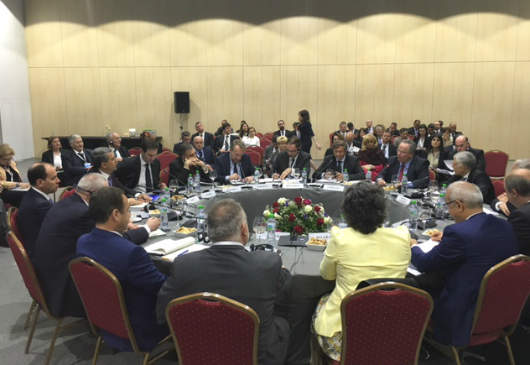 Foreign Minister Nikos Kotzias made the following statement to Independent Balkan News Agency reporter Spyros Sideris on the margins of the Summit Meeting of the South East European Cooperation Process (SEECP), in Sofia, Bulgaria:
Foreign Minister Nikos Kotzias made the following statement to Independent Balkan News Agency reporter Spyros Sideris on the margins of the Summit Meeting of the South East European Cooperation Process (SEECP), in Sofia, Bulgaria:
N. KOTZIAS: Today we had the meeting of the presidents, prime ministers and representatives of the member states of the South East European Cooperation Process (SEECP). We discussed the same subjects as yesterday, in a more political tone. We agreed on the need for cooperation in important sectors such as energy, transport, high tech, security, terrorism.
For our part, we added – and this was adopted – the need for upgrading of the role of culture and of cooperation on education and research. And it was also agreed that, in the future, there will be special programmes and actions concerning youth, rendering the whole effort we are making more attractive to young people. Such forms of cooperation might include film and music festivals, Olympics in math or high technology, the creation of potential for competition among young entrepreneurs – startups – in new technology. As you know, this venue we are at is a new technology venue at which thousands of employees work and collaborate with high-tech companies in Bulgaria and abroad.
JOURNALIST: Is there convergence among the countries of Southeast Europe on building a creative core for pointing up the whole of Europe?
N. KOTZIAS: I think what we agreed is that, especially in new production sectors, there needs to be development in all of the countries in order to create the right critical mass that will make the region attractive – attracting large-scale investment in new technology sectors.
JOURNALIST: Was there anything different in the meetings you had here?
N. KOTZIAS: I think the most important meeting was the quadrilateral we held. For some time now, Greece has been working in this direction. The Quadrilateral is Bulgaria, Croatia, Romania and Greece. That is, it is an informal, non-institutionalized collaboration that, however, comes together regularly, as we agreed. And it will concern issues of cooperation between these four states, so that the European Union’s presence in our region can become more effective and apparent from the point of view of development of the social and economic programmes, and also from the point of view of issues related to foreign policy. The spirit of the Quadrilateral is that third countries, even member states of the European Union, cannot try to decide for the region without listening to – and often taking as paramount – what the Balkan member states of the EU have to say.
June 1, 2016


